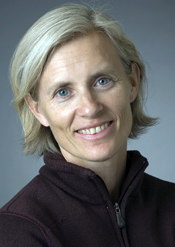Campus News
Grant supports UC Santa Cruz research on the cause of childhood leukemia
A new grant from the nonprofit Alex’s Lemonade Stand Foundation will help UCSC researcher Camilla Forsberg advance her work to identify the root cause of acute lymphocytic leukemia (ALL) in infants and children.

Biomedical research at UC Santa Cruz has the potential to change how the most common type of childhood cancer is treated. A new grant from the nonprofit Alex’s Lemonade Stand Foundation will help UCSC researcher Camilla Forsberg advance her work to identify the root cause of acute lymphocytic leukemia (ALL) in infants and children.
Approximately 2,900 children and teens are diagnosed with ALL each year in the United States. Most are ages 2 to 3 years when diagnosed.
Forsberg, associate professor of biomolecular engineering in the Jack Baskin School of Engineering, and co-director for the UCSC Institute for the Biology of Stem Cells, is one of 16 researchers nationwide who have been awarded the foundation’s Innovations Awards. The two-year, $250,000 awards provide critical and significant seed funding for experienced investigators with novel and promising approaches to finding causes and cures for childhood cancers.
“Understanding the cause of this disease will enable the design of drugs that specifically eliminate cancer cells, said Forsberg, “without causing damage to the body’s healthy cells while curing children with cancer.”
Avoiding treatment side effects is particularly important in children, as their growing bodies are much less able to tolerate standard chemotherapy. The idea of specific drug targeting is based on the success with the drug Gleevec in treating patients with chronic myelogenous leukemia.
Leukemia is a cancer that starts in early blood-forming cells. In a healthy child, the bone marrow makes blood stem cells (immature cells) that become mature blood cells over time. Cancer researchers like Forsberg are seeking a better understanding of what causes blood-forming stem cells to start behaving abnormally.
The Forsberg Lab is researching how the most common and aggressive type of infant blood cancer, B-cell acute lymphocytic leukemia (B-ALL), arises before or soon after birth in some children.
Much less is known about the causes of cancer in infants and children than in adults. It is known that most cases of leukemia in infants are caused by mutations in a gene called MLL.
Funding for this project, Forsberg says, will help her lab conduct research to define the properties of this cell type and to determine its role in B-ALL. She believes that MLL mutations in this type of cell lead to infant leukemia.
“We have identified a cell type present only during prenatal development,” said Forsberg, “that has properties similar to the cells present in kids with MLL-induced leukemia.” These cells generate a fresh supply of new blood and immune cells to replace old, worn-out cells that are destroyed by the body. In leukemia, these blood-forming cells grow out of control, crowding out normal blood cells that are necessary for everyday life.
Alex’s Lemonade Stand Foundation began as an effort by a four-year-old child who, in 2000, had been living with a childhood cancer for two years. With her brother’s help, Alexandra Scott set up a lemonade stand in her Connecticut front yard to raise money to help find a cure for pediatric cancer. Alex raised $2,000 and donated the money to her local children’s hospital. By 2004, fundraising efforts had spread nationwide. Soon after Alex’s death at age 8, her parents established the foundation. The charity has raised more than $75 million and has funded more than 375 research projects nationally.
“We are so pleased and inspired by this gift,” said Forsberg, “and we hope people will come to our own Alex’s Lemonade Stand in April.” For more information about the event, hosted by the UCSC Center for Biomolecular Science and Engineering (CBSE), go to the CBSE Lemonade Stand for Pediatric Research Facebook page.